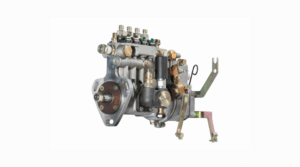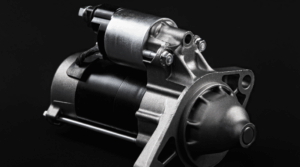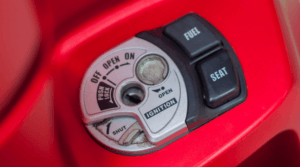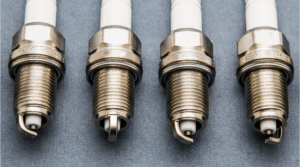Hello people, I want people, regardless of in which part of the world they are living to have a phenomenal driving experience. Thus, I’m sharing how the car shuts off while driving and the measures to prevent it.
Quick Navigation
Car Turns Off While Driving But Turns Back On
A car is a complex machine running with the help of the synchronization of lots of parts, wires, and systems in place. If your car shuts off while driving, you’re in a crazy situation. It can be challenging to pinpoint what is causing the problem, but specific rules can be followed to keep yourself and others safe when your car randomly shuts off.
However, the most common causes for cars shutting down are easy to rectify.
The most common reasons for cars shutting, in my experience, happen to be a bad crankshaft position sensor or an inadequate fueling system. Other causes include the substandard alternator, ignition switch, car engine sensors, or empty fuel tank.
Reasons Why Your Car Turns Off While Driving?
Faulty Crankshaft Position Sensor
The crankshaft position sensor plays a crucial role in monitoring the engine’s motion, as it measures the speed and position of the crankshaft to optimize fuel injection and ignition processes.
This mechanism is vital for ensuring the engine operates at peak performance. A compromised or malfunctioning crankshaft position sensor may not relay accurate piston position information to the engine control unit (ECU), leading to cylinder misfires. A malfunctioning crankshaft position sensor can trigger the check engine light.
Another indication of a faulty sensor is an erratic tachometer, which measures your car’s RPMs and is typically situated alongside the speedometer on the dashboard. As you start the engine, the tachometer typically rises and stabilizes at the desired speed.
The ECU obtains engine speed data from the crankshaft position sensor, which is then transmitted to the tachometer. If the sensor is faulty, it may send incorrect information to the ECU and, ultimately, the tachometer, causing inconsistent readings.
To determine if your crankshaft position sensor is faulty, use an OBD scanner to read error codes from the ECU.
Diagnostic trouble codes ranging from P0335 to P0338 may indicate an issue with your crankshaft position sensor. While an OBD scanner may not pinpoint the exact problem, it can help narrow down potential culprits.
In the absence of an OBD scanner, closely monitor fuel efficiency, as a defective crankshaft sensor can negatively impact your vehicle’s mileage.
Faulty Fuel Pump or Fuel System
The primary function of a fuel pump is to provide the engine with the appropriate quantity of fuel. If the fuel pump fails to do so effectively, the engine will shut down, leading to undesirable consequences.
Unfortunately, there is no temporary solution for a malfunctioning fuel pump; it must either be repaired or replaced.
Another potential issue could be a clogged fuel filter, impeding fuel flow through the pump. A fuel filter, though small, plays a critical role in purifying the fuel that reaches the engine. If the filter becomes obstructed or clogged, the fuel supply to the system will be inadequate, causing the engine to shut off.
The good news is that replacing a fuel filter is generally a straightforward process. Fuel pumps are typically housed within the fuel tank. If your car unexpectedly shuts off while driving, try gently tapping the fuel tank with your foot or applying similar pressure when the car is turned off.
If the car restarts, it’s likely that the fuel pump is the source of the issue.
Be cautious not to strike the fuel tank with a sharp object, which could puncture the tank and exacerbate the problem.
If your car shuts off when stopped or slowing down, it can often happen due to a defective fuel pump.
Engaging Read – Steering Wheel Locked Up While Parked | What Should I Do?
Defective Alternator
The alternator regulates your vehicle’s electrical supply by converting its mechanical energy into electrical energy to operate and control various components. It utilizes this electrical energy to power features such as dome lights, dashboard lights, air conditioning, and the stereo system while charging the battery.
If the alternator malfunctions, your car may lack the necessary electrical energy, potentially causing it to shut off while in motion.
A flashing dashboard is often an indicator of this issue. It’s important to note that if your alternator fails. Still, you have a high-quality battery, the battery may temporarily power your car for a short distance, delaying the identification of the issue.
However, a battery is not designed to power the car for an extended period, and once it is depleted, the vehicle will come to a complete stop. By being vigilant, you may detect early signs of an alternator malfunction, such as your car receiving inconsistent power.
Invest in a multimeter or voltmeter to routinely test your battery and alternator—every 3-4 months should suffice.
Empty Fuel Tank
It’s well-known that monitoring your vehicle’s fuel level is essential for smooth operation. While you might have adequate fuel in your tank, a malfunctioning fuel gauge or fuel level sensor can misrepresent the actual amount, potentially causing problems.
A frequent cause of this issue is the failure of the sending unit, which results in the fuel gauge remaining stuck in one position, regardless of the true fuel quantity.
Though less common, a defective sender may also cause the gauge to display a full tank despite not being filled to capacity, which could indicate a faulty resistor.
If you suspect an issue with your fuel gauge or sensor, try adding four liters of fuel and see if your vehicle starts up again.
Defective Ignition Switch
A malfunctioning ignition switch may also make your car suddenly turn off while in motion. The ignition switch is activated behind the ignition lock when you rotate the key to initiate the car. Over time, the minute metal plates within the ignition switch can develop rust.
This corrosion can cause one of the plates to lose contact, leading to the entire ignition system shutting down. This ignition issue may not manifest immediately but can cause your car to stop while on the road unexpectedly.
To diagnose this problem, observe your dashboard. If the engine and all dashboard lights simultaneously turn off, it is highly likely that an issue with the ignition switch is the culprit.
Broken or Slipped Timing Belt
A broken or slipping timing belt is another reason for car turn off while driving but turns back on. A failed or defective timing belt will prevent your engine from starting; even if it starts, it will run poorly. A run-down timing belt can stretch beyond the required size causing all the problems.
A stretched timing belt will lower your power output, and affect the mileage, especially under heavy loads and regular engine misfires, leading to your car abruptly stopping while driving.
If the timing belt is irreversibly damaged or broken, the engine will stall and won’t restart.
Overheated Engine
Another prevalent but overlooked reason is why your car shuts off when stopped or slowing down. Overheating can happen for various reasons, primarily because of a lack of engine coolant or the coolant residue around the engine.
Low pressure in the coolant system or a broken timing belt is the common reason causing coolant-related engine malfunctions.
Coolant leaks often occur from coolant hoses, radiators, broken reservoirs, and the radiator cap. A faulty radiator cap can cause the issue without you even realizing it until it’s too late.
Faulty Spark Plugs
Despite their small size, spark plugs are crucial in generating power within an engine. Their primary function is to ignite the air-fuel mixture in the engine combustion chamber, leading to combustion.
Each cylinder in an engine has its own spark plug. A vehicle can still operate with a single malfunctioning spark plug, but having more than two faulty ones can cause significant damage to the engine.
The engine may start with more than one defective spark plug but won’t remain operational for long. If you pay close attention, you can detect warning signs before the engine completely shuts down.
These symptoms include reduced engine performance, sluggish acceleration, misfires, and knocking or hammering sounds emanating from the engine.
Defective Sensors
Today’s automobiles are not merely mechanical machines but also advanced electronic devices. The sensors integrated into these vehicles play a crucial role in numerous functions, such as optimizing the air-fuel mixture to achieve the best fuel efficiency.
However, if any of these sensors fail and cease functioning, it can create a ripple effect throughout the entire system, ultimately leading to engine failure.
The Mass Air Flow (MAF) sensor is vital to a car’s functioning. It measures the volume of air entering the engine and transmits this information to the engine control module, which determines the amount of fuel that needs to be delivered by the fuel injectors. If the MAF sensor malfunctions, it can cause the engine to shut down, leaving the driver stranded.
Typical indications of faulty sensors include sluggish, rough, or uneven acceleration, difficulty starting the engine, and the illumination of the check engine light.
Interesting Read – Driving With Bad Purge Valve | 100% Fixed
What to Do During a Car Cut Off While Driving?
Pull Your Car Off Road Immediately
Get the car to the side of the road and then retreat from your car to a safe distance, away from other commuters. Like you, other people on the road don’t expect your car to shut down. It is a hazardous situation, so you should be very careful. If your car dies in the middle of the road, immediately call for help, and don’t leave the car until you’ve checked it’s safe to go out.
Try Restarting Your Car
As you are on the side of the road and out of danger, try to restart your car. Try to reach the nearest auto repair shop. Restarting the car will become easier if you are fortunate and able to determine the actual problem in the car.
Turn On Your Hazard Indicators If Possible
If restarting the vehicle is not an option, turn on all your hazard indicators and safety flashers to let others know your car is stationary. This will keep you out of danger until you determine the next possible steps.
In Case Of Extreme Necessity, Contact the Emergency Hotline.
When you’ve tried all the tricks up your sleeve and are out of choices, it’s best to call an emergency number or roadside assistance service like AAA. If your phone is dead or there is any network-related problem, call the police. They can also get in touch with AAA for you.
FAQs
Below are the frequently asked questions on car turns off while driving but turns back on. Let’s get into some related queries.
What does engine failure sounds like?
A failure in the engine generally produces a knocking sound coming from under the hood, which increases and decreases depending on the vehicle’s RPM.
Can a bad battery cause a car to stop while driving?
It is possible that a battery can cause a car to shut off while driving. Corroded chemicals in the battery are the most common reason for a bad battery in a car. The alternate must use additional electrical power to keep your car running when your battery is weak. The extra stress can lead to the car shutting down suddenly while driving.
Can low oil cause a car to shut off?
Modern cars are loaded with safety features, and one of them is an automatic shutoff when the oil pressure drops to a certain level or the oil level drops too low (not applicable to all cars). This is the reason behind the sudden stalling of the engine.
What does a car sound like when it needs oil?
When there is a need for an oil change, your car engine will make a louder noise than usual. A prolonged shortage of oil filling will result in increased sounds like rumbling, knocking, and even roaring.
What does a failing transmission sound like?
Failing transmission sounds different for manual and automatic transmission cars. Defective automatic transmission emits like buzzing, humming, or whining. On the other hand, manual transmissions have a “clunking” sound at the time of an engine failure.
Final Thoughts
That was all I wanted to say about car turns off while driving but turns back on problem. Following the above mentioned points will significantly reduce your chances of getting into trouble during car failure. While I wish no one suffers from such a problem, as some wise person once said – precaution is better than cure.







